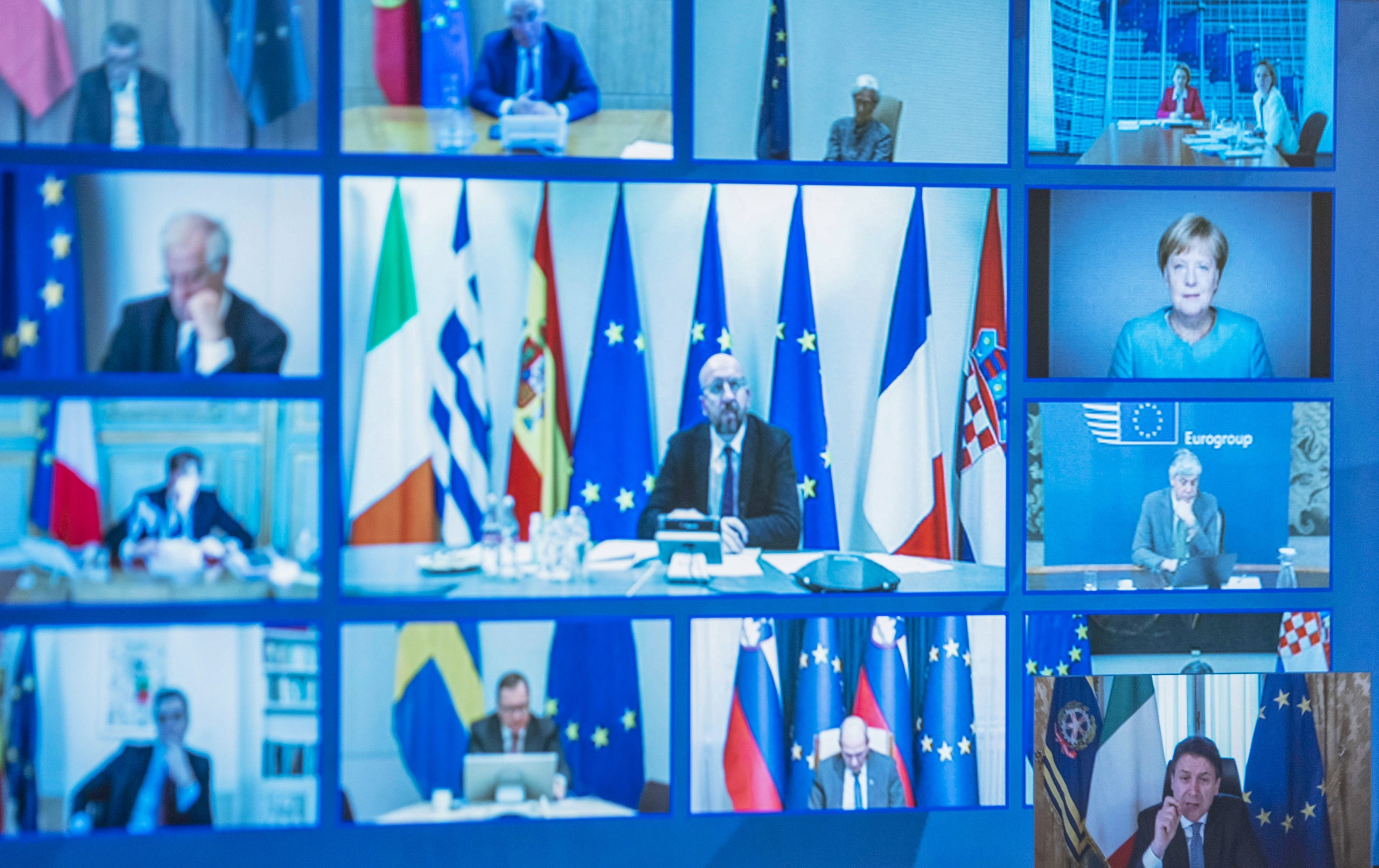Lagarde warns EU leaders over virus rescue plan
Through the glass darkly (Handout)
Brussels (AFP) – The European Central Bank chief issued a dire warning to EU leaders as they met by video Thursday bitterly divided over a giant package to help their economies recover from the coronavirus pandemic.
The situation facing the EU is urgent: more than 110,000 confirmed COVID-19 deaths and the economy suffering an unprecedented collapse according to alarming new data.
ECB chief Christine Lagarde told the leaders that in the bank’s worst-case forecast, the bloc’s GDP could fall by as much as 15 percent in 2020 as a result of virus lockdowns.
She warned the 27 members that “there was a risk of acting too little, too late,” a source said.
Lagarde has led the fight against staving off a recession in Europe, releasing 750 billion euros ($811 billion) in monetary stimulus, but she has urged EU governments to do more.
But while leaders agree that an effort running into hundreds of billions of euros will be needed, they are split over how it should be funded and shared.
It is the EU’s fourth video summit on the virus crisis in seven weeks — a sign, one senior Brussels official said, of the “seriousness of the challenge and the importance we attach to a common solution”.
German Chancellor Angela Merkel, one of Europe’s most influential leaders, gave her firm backing to beefing up the EU budget, but others are looking for more novel ways to reboot the economy, including joint borrowing.
The fight has reopened the wounds of the 2009 financial crisis, once again pitting northern and southern Europe against one another.
Southern states like Spain and Italy, badly hit by the disease and heavily indebted, are demanding “solidarity” — financial help — from their richer partners far beyond what the EU budget can normally provide.
“The countries of the south have the impression that certain states, which are currently economically stronger, will use this crisis to be even stronger,” a senior European official told AFP.
“And those in the north believe that the south will take advantage of the pandemic to unburden themselves of past debt,” the source added.
Italian Prime Minister Giuseppe Conte has for weeks pushed hard for mutualised EU debt, dubbed “coronabonds” that would spare his country further financial pressure.
Spain has proposed the idea of “perpetual bonds”, usually only used in wartime, while France backs an ad hoc “investment vehicle” outside the EU budget.
But an EU source said the Italians had been weaned off “toxic concepts” like coronabonds, with consensus now emerging over using a strengthened Brussels budget.
“The European budget has for decades been the tried and tested instrument for common tasks in the EU,” Merkel told lawmakers in Berlin ahead of the crunch talks.
“In the spirit of solidarity, we should be prepared to make completely different, that is to say significantly higher contributions to the European budget over a set period,” Merkel said.
– Ferocious slump –
Given the divisions, EU Council President Charles Michel, the nominal host of the summit, set a low bar in the invitation letter sent to leaders on Tuesday.
He urged them only to “work towards” creating a European Recovery Fund to rebuild the bloc’s economy after the pandemic eases.
The leaders are expected to ask the European Commission, the bloc’s executive in charge of the EU budget, to come back with a proposal by the end of the month.
They will also sign off on a 540-billion-euro emergency package agreed by EU finance ministers earlier this month.
The summit takes place as a closely watched business survey said the eurozone economy was experiencing an “unprecedented” collapse.
“The ferocity of the slump has… surpassed that thought imaginable by most economists,” said the chief economist of IHS Markit Chris Williamson.
The cost of rebuilding will be enormous and various figures have been bandied around for the recovery fund, though no final amount is expected on Thursday.
Mario Centeno, head of the Eurogroup of eurozone finance ministers, has suggested a range of 700 billion to 1.5 trillion euros and French Finance Minister Bruno Le Maire has mooted one trillion.
A senior EU official acknowledged no definite plan was likely before the summer but said Thursday’s meeting could see progress on ways to include the recovery fund in the bloc’s new seven-year budget, as wished by Berlin.
But even before the pandemic, months of negotiation of the EU’s 2021-27 budget caused bitter and unresolved fights among the EU leaders.
Disclaimer: Validity of the above story is for 7 Days from original date of publishing. Source: AFP.


